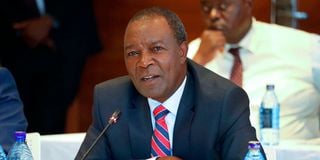Finance Bill 2023: Treasury CS says Kenya among EA countries with low taxes

Cabinet Secretary for National Treasury and Economic Planning Prof Njuguna Ndung’u
National Treasury Cabinet Secretary (CS) Prof Njuguna Ndung’u has defended proposals in the Finance Bill 2023 on increment of taxes on various sectors saying it is a projection of where the economy should head.
Prof Ndung’u said some of the proposals in the Bill are meant to align Kenya with other East African states saying Kenya has been rated as one of the countries in the region paying low taxes in a number of products.
"The new tax proposals is part of Kenya to bring uniformity with East Africa community. In a number of sections, Kenya is rated lowest in Value Added Tax in different sections that one of the things is using the idea of increasing tax for uniformity purposes," said Prof Ndung'u.
Speaking at Kenya Ports Authority (KPA) Kipevu Oil Terminal 2 while receiving two ships; Mv Proteus Jessica and Mv Nan Ln Wan with petroleum products, the CS said some of the proposals will only be applicable if passed at the public participation stage.
“According to the Public Finance Management Act, it requires the Cabinet Secretary of the National Treasury and Planning to submit to the National Assembly the Finance Bill of any subsequent year before April 30 with tax proposals to aid in the attainment of the government’s objectives and that is what we did,” said Prof Ndung’u.
He added, “But we are moving in the next stage of public participation where if proposals are adopted, they become law. What we are saying the proposals on taxes is the way to go but are not casted on a stone since they give direction on our future direction.”
In the 2023/2024 Finance Bill, National Treasury included proposed amendments to various tax statutes such as the Income Tax Act, the Value Added Tax Act, the Tax Procedures Act and the Miscellaneous Fees and Levies Act.
Among the issues which has been raised by a number of stakeholders in the Bill includes increment of tax on petroleum products from the current 8 percent to 16 percent as from July 1 if the proposal is adopted.
Audit firm KPMG, in its review of the Bill, warns the proposal “is likely to impact the prices of transport and production of goods, increasing the inflationary pressure on the economy.”
Prof Ndung’u said government-to-government program to import petroleum products is one of the strategies the government is doing to stabilize dollar since it gives time government to pay the producs in future.
“Today we received the two ships with 100,000 million metric tones of disiel and petrol and the April consifnment will be paid in September whereas today’s consignment will be paid in October. This will give us time before payment and will reduce demand of dollars during this time of blackbuck shortage,” said Prof Ndung’u.
CS Energy and Petroleum Davis Chirchir on the hand said the government is in the final stage to increase storage capacity of petroleum products in Mombasa and different cities to ensure there is constant supply of such commodities to control prices.
“Kenya Pipeline Corporation (KPC) has concluded the takeover of the defunct State-owned Kenya Petroleum Refineries Limited(KPRL) which will assist in ensuring we bring down cost of petroleum as we shall have done away with demurage costs,” said Mr Chirchir.
KPRL has 45 tanks with a total storage capacity of 484 million litres out of which 254 million litres is reserved for refined products while the remaining 233 million litres is reserved for crude oil.
Mr ChirChir said the government is also at the final stage in the construction of 30,000 metric tones Liquefied Petroleum Gas (LPG) handling and storage facility,” said Mr Chirchir.
The facility in Mombasa once completed will quicken the loading of cooking gas for distribution by trucks which will help to cut demurrage costs.
Demurrage refers to the charge that the merchant pays for the use of the container within the terminal beyond the free time period due to delays in offloading as a result of lack of storage facilities which is mostly transfered to consumers making petroleum products expensive.
KPC says faster loading is expected to translate to lower prices for LPG by 30 percent once operational as oil marketing companies pass the benefits of reduced demurrage costs to consumers.





